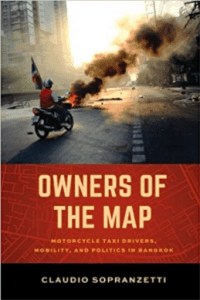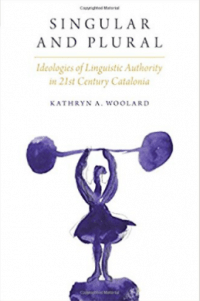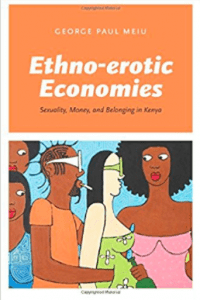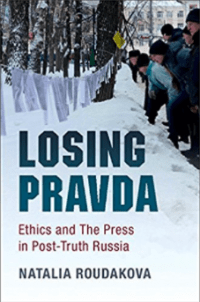This month’s round up of the best anthropology podcasts brought to you in collaboration with the ever amazing New Books in Anthropology features motorcycles, Catalonians, sex work and the truth.
 Owners of the Map: Motorcycle Taxi Drivers, Mobility and Politics in Bangkok
Owners of the Map: Motorcycle Taxi Drivers, Mobility and Politics in Bangkok
by Claudio Sopranzetti
(University of California Press 2017)
When the army brutally dispersed Red Shirts protestors in Bangkok’s busy commercial district in May 2010, motorcycle taxi drivers emerged as a key force, capable of playing cat-and-mouse with security forces, evading military checkpoints, and rescuing protestors and their leaders once the army attacked them. Motorcycle taxis are ubiquitous across the developing world. Dexterously weaving in and out of dense urban conurbations, they transport people, commodities and news through peak traffic with an unparalleled knowledge of the city. They are owners of the map.
In his vividly etched monograph, Owners of the Map: Motorcycle Taxi Drivers, Mobility and Politics in Bangkok (University of California Press, 2017), Claudio Sopranzetti moves across the city and between city and country to examine how migrant laborers driven off the factory floor following structural adjustment reforms in the late-1990s turned to motorcycle taxi driving as a form of flexible and yet unfree means of livelihood. Owners of the Map not only confronts the specific realities of ordinary Thais resisting military authoritarianism over a decade-long period, but also the question of how modes of circulation can become sites of collective action, particularly for precarious workers, in the neoliberal moment.
Interview by Madhuri Karak
Listen here!
 Singular and Plural: Ideologies of Linguistic Authority in Twenty-First Century Catalonia
Singular and Plural: Ideologies of Linguistic Authority in Twenty-First Century Catalonia
by Kathryn Woolard
(Oxford University Press 2016)
Kathryn Woolard is Professor Emerita and Research Professor of Anthropology at the University of California, San Diego. She has authored seminal works on language ideology and the sociolinguistic situation in Catalonia, including the present book Singular and Plural: Ideologies of Linguistic Authority in Twenty-First Century Catalonia (Oxford University Press, 2016) which won the 2017 Society for Linguistic Anthropology Edward Sapir Book Prize. Bringing together two of her longstanding areas of research interest in this book, Woolard develops a framework for analyzing ideologies of linguistic authority and applies it to the evolving political situation in Catalonia.
In this interview, Woolard discusses the key theoretical and contextual elements of the book, broadly following its three-part structure. First, the concepts of linguistic authenticity, anonymity, sociolinguistic naturalism are introduced, and Woolard sets out the changing ideological grounding of linguistic authority there over the course of twenty years of fieldwork in Catalonia. Next, Woolard’s theoretical framework is applied to the case of a popular satirical television program which catalyzed the sociolinguistic rehabilitation of a Catalonian president whose Castilian Spanish was better than his Catalan. Finally, Woolard discusses her early and recent fieldwork in a Catalan-medium high school, and her experiences of following up on research informants first interviewed twenty years ago.
Interview by John Weston
Listen here!
 Ethno-erotic Economies: Sexuality, Money and Belonging in Kenya
Ethno-erotic Economies: Sexuality, Money and Belonging in Kenya
by George Paul Meiu
(University of Chicago Press 2017)
Professor George Paul Meiu‘s debut anthropological book, Ethno-erotic Economies: Sexuality, Money, and Belonging in Kenya (University of Chicago Press, 2017), dives into the commodification of culture and sex on the beachfronts of coastal Kenya, as well as the ramifications and shifting economic power dynamics in rural Samburu villages that result from this new economy. Utilizing over a decade of community engagement and research, Meiu expertly engages in intense anthropological study without exploitation and judgment. Rather he succeeds in humanizing his subjects as he explores the creation and development of a new economy, that of engaging with white, largely Western European women, in romantic relationships in exchange for money, goods and, eventually, higher economic and social status in their home rural communities. But with this new economy comes challenges to traditional social structures, as sexuality and wealth intersect with traditional land tenure and power. Meiu, with his deep understanding of the Samburu people, rituals and culture, explores how power dynamics change, and how new money is challenged and reconciled. This book is highly readable, without skimping on academic literature and theoretical context, resulting in a book that will engage everyone from first year anthropology students through seasoned academics.
Interview by Erin Freas-Smith
Listen here!
 Losing Pravda: Ethics and the Press in Post-Truth Russia
Losing Pravda: Ethics and the Press in Post-Truth Russia
by Natalia Roudakova
(Cambridge University Press 2017)
Natalia Roudakova’s book Losing Pravda: Ethics and the Press in Post-Truth Russia (Cambridge University Press, 2017) explores changes in the world of journalism in Russia in the last fifty years. Drawing from more than a decade of research of various ethnographic and historical sources, Roudakova approaches truth as a social category. She demonstrates that the status of truth was relatively secure and stable under the Soviet state socialism. It was the transformation from communism to capitalism that led to a drastic dissolution of a sense of responsibility towards the public and, consequently, into the very possibility to produce truth in the post-socialist era. Looking into everyday practices of Soviet journalists and the post-socialist transformation of the media, Losing Pravda provides a glimpse into one possible future of the US and other post-truth settings in the West. Exploring how truth-seeking and truth-telling work under different socio-political conditions, it offers a new, ethics-based vocabulary for thinking about production of facts and meaning in contemporary world.
Interview by Carna Brkovic
Listen here!
Featured image (cropped) by Stefano Corso (flickr, CC BY-NC-ND 2.0)



